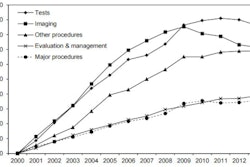The Medicare Payment Advisory Commission (MedPAC) has proposed a new Medicare payment model in its June 2013 report to Congress.
The commission suggests that Congress consider a new payment model it calls competitively determined plan contributions (CPC). Under this structure, a federal contribution toward the coverage of Medicare benefits would be calculated based on the cost of competing options for the coverage, including those offered by private plans and by the traditional Medicare fee-for-service (FFS) program, MedPAC wrote.
This new approach could keep premiums and overall healthcare spending down compared to the present payment model, which is based on unrestricted fee for service with open-ended provider participation, according to MedPAC.
A CPC approach would consist of three main participants:
- The Medicare program, which would design the system and make the rules that result in the CPC contribution amount and payments to plans
- Private insurers, who would use these rules to guide their business decisions
- Beneficiaries, who would choose a private plan or Medicare fee for service for their Medicare coverage, based on the premiums each option offered and the CPC contribution
"A successful CPC model would depend on strong competition between FFS and private plans offering lower premiums and more attractive benefits and informed beneficiaries who respond to those offerings," MedPAC wrote.
Repeal SGR now
Also in its report, MedPAC urged Congress to repeal the sustainable growth rate (SGR) -- the formula for annually updating Medicare's payment rates for physician and other health professional services -- rather than continue to pass short-term patches.
"The SGR formula may have resulted in lower updates, but it has failed to restrain volume growth; in fact, for some specialties the formula may have exacerbated growth," MedPAC said. "In addition, the temporary increases, or 'fixes,' to override the SGR formula are undermining the credibility of Medicare by engendering uncertainty and frustration among providers, which may be causing anxiety among beneficiaries."



















